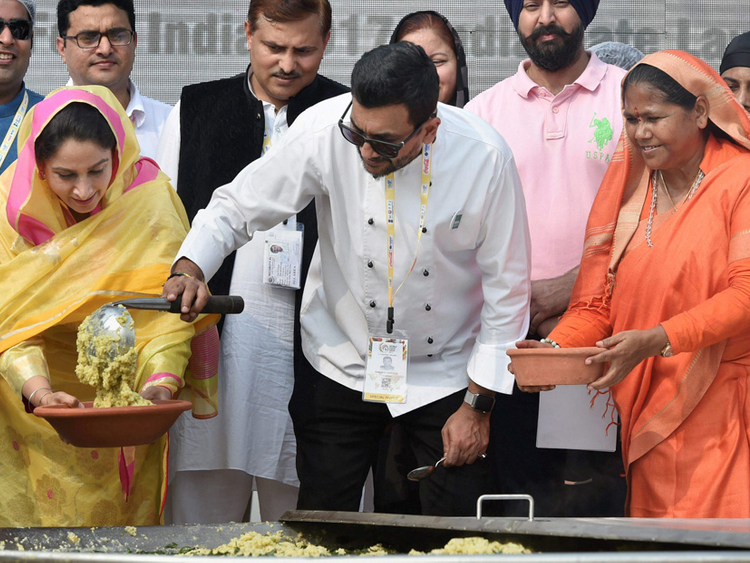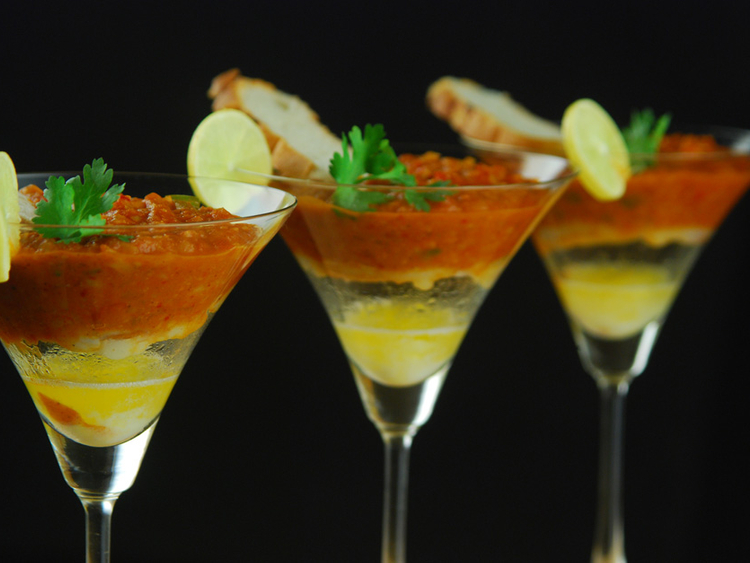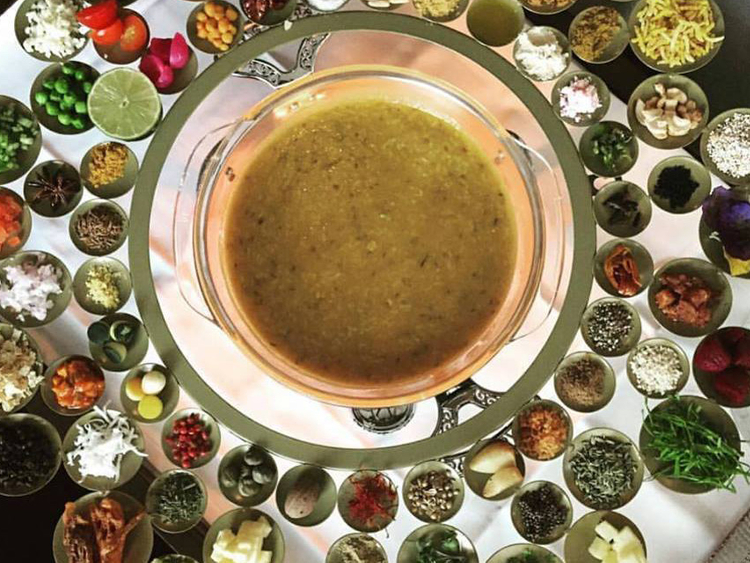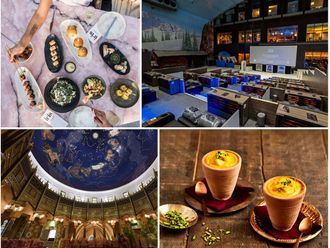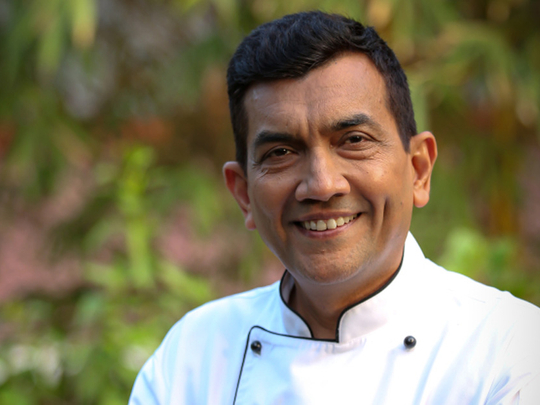
Indian food could be the next breakout cuisine if Sanjeev Kapoor has his way. And it will all have started over a giant pot of khichdi — a Guinness-certified world record-breaking pot of mushy rice, lentils and vegetables, to be precise — the celebrity chef says ahead of a visit to the UAE this weekend, where he is one of the headliners at Taste of Abu Dhabi.
On Saturday, Kapoor and a team of 50 people spent several hours cooking a whopping 918 kilos of the comforting porridge, nearly double the previous record of 500 kilos. Approximately 10,000 portions were served at the event in New Delhi and to disadvantaged children in the capital.
The record attempt was part of World Food India, a trade show conceptualised to put India on the global food manufacturing map, but the effort nearly ended up as an epic food failure, Kapoor told me over the phone yesterday.
“We spent three months getting everything together, building the wok, constructing a giant weighing scale, doing test runs — but on Saturday morning, the elaborate steam cooking process we’d constructed simply shut off,” he says, laughing now at the close shave.
At 6.10am, he recounts, neither the suppliers who’d constructed the custom-built pot, nor the team that had supervised the heating process could be contacted. There were going to be 150 TV cameras recording everything live, in addition to the vast audience of dignitaries and other officials, he says. “The only thing we could do was pray.”
Cooking without fire
Part of the problem were the barriers placed in Kapoor’s way before he even began. Given the scale of the event — Prime Minister Narendra Modi inaugurated the three-day show and ministers from India and other countries were in attendance — security officials had refused to allow any fire on the grounds of Pragati Maidan, where the event was held. “I asked them how I was supposed to cook without fire,” Kapoor says, explaining that Guinness rules required that whatever was cooked had to be eaten.
He finally hit upon the idea of using steam instead. “So we had a three-layered stainless steel vessel constructed that was fed by a diesel-fired boiler 250 metres away, which supplied the steam for cooking.”
It was the steam that was the problem — the equipment had been designed to automatically shut down if too much steam was generated so as to ensure the safety of everyone present. “Thankfully, we finally roused the suppliers and fixed the problem to the satisfaction of everyone present,” Kapoor says. “With the steam back on and any safety issues anticipated, we could proceed on schedule.”
All through, the former hotel head chef approached the situation with the qualities TV audiences will know him for: resourcefulness and humour. When something goes wrong on TV — even on a schedule of five episodes a day — it can be fixed by cooking (and filming) the dish again. When something goes wrong at a live event, he told me via email ahead of the record attempt last week, he plasters on a smile and thinks about how to fix it. “By God’s grace, I have the ability to handle a situation like this with a hint of humour. It always works,” he says.
So on Saturday, Kapoor knew to anticipate more problems. “All through, while I was smiling at the event, all I was thinking about was what else could go wrong,” he laughs.
Social media storm
He was to find out that afternoon, when the record had been broken and the pot was being scraped clean, new drama erupted: A storm broke on Twitter and in the media about whether khichdi should be promoted as Brand India food, and whether the minister had unwittingly declared it the country’s national dish (she didn’t actually say as much, issuing a clarification the next day). Others raged about whether sustenance food was worth showcasing at all, or indeed whether it truly represented India’s variety, diversity or creativity. That the entire exercise was executed for “peanuts”, as Kapoor puts it – about $30,000 or Dh110,000 — seems to have been lost in the fury.
“The restaurant fare that the world associates with India — the butter chicken and so on — isn’t home-style food. And they don’t even represent all of India. Every 100 kilometres there’s a different cuisine, but what binds the nation together is our love for rice and dal — whether it’s khichdi, varan bhaat or a dosa. The ingredients are the same,” Kapoor told me yesterday.
Regardless, he says, the objective has already been achieved — he’s had enquiries for dehydrated versions of the khichdi from several quarters, both in India and overseas. “We’ve shown what India can do. The next step is to formulate a coherent strategy about how to take things forward,” Kapoor told me over the phone from Mumbai yesterday. “Done right, India can become the food factory of the world, we can reduce the annual loss of Rs850 billion (approximately Dh48.4 billion) and give farmers the opportunity to broaden their market.”
More than even Vineet Bhatia or Manish Mehrotra, who I must admit are my personal icons, it is Kapoor, 53, who taught Indians to love our own nation’s many different cuisines — and who has taken our recipes international. Many’s the time I’m looking for a particular recipe — apple jalebis most recently — and I’ve found it on Kapoor’s website. These are easy solutions for harried home cooks, a formula he perfected on Khana Khazana, the TV show that endeared him to grannies and millennials alike, aired on Zee TV for 18 years, becoming India’s longest-running series.
In the 25 years since that show first went on air, Kapoor, who became only the third chef to be honoured by the Indian government with the prestigious Padma Shri in January, has broadened the market for Indian food abroad by exporting ground spice mixes and pre-packaged ready-to-eat foods to the far corners of the earth. The Punjabi chef has produced dozens of cookbooks on his own and in collaboration with others, and is associated with several restaurant brands, including the Yellow Chilli, Khazana and Signature here in Dubai — and astonishingly, runs a culinary arts degree in association with Symbiosis University in Pune, Maharashtra.
It’s no surprise, then, that he’s a regular draw at Taste of Abu Dhabi and its sister event in Dubai. “Is it the smile,” he jokes in response, explaining that he loves public events because he can cook for an audience, and interact with people who are passionate as he is about food. When I ask if he’s showcasing khichdi — often called an Indian risotto — he says he hadn’t thought of it, but probably will do so now.
___
Don’t miss it!
Tickets for Taste of Abu Dhabi start at Dh65, and are available at tasteabudhabi.com.
___
RAPID FIRE WITH SANJEEV KAPOOR
What are you doing at Taste of Abu Dhabi?
What I do the best that is, cooking. Also, interacting with all those who are as passionate as I am for food.
Looking back on your career, what’s been the biggest reason for your success?
Firstly, I owe it all to my family and friends who have been a constant support throughout. Other than this, I would say that it’s the simplicity that I have always believed in. Nothing beats that.
As Indian food has evolved, we’ve seen some strange new concoctions — such as Chinese Bhel. What’s your view of these?
It’s the need of the hour. We have to accept and move ahead with the changing times.
What do you eat at home?
Kadhi-chawal, rajma-chawal, dal-chawal, undhiyo, etc.
What’s comfort food for you?
Homemade food, now and forever.
Three ingredients you’d take to a desert island? Why?
Lemon, salt and pepper. Guess why?
Name one ingredient people don’t use enough of? Why do you say that?
Makhana or lotus seeds. It’s not that people don’t know about it, what I really feel is that it hasn’t received its due share of success as an ingredient. It’s light on the stomach, is packed with numerous health benefits and is exotic at certain levels. Go for it.
Who’d be around your ideal dinner table?
My family, always.
___
What do you know about khichdi?
A soothing mash served to the sick and the toothless, there’s no exact recipe for khichdi — as with most Indian dishes.
However, the breakfast staple is one of the few things that has looked and felt recognisably the same across the subcontinent over the centuries, though, as one might expect from the notoriously diverse nation, key ingredients often differ.
Rice and lentils have formed the basis of this one-pot dish since at least 250BC, when the Greek general Seleucus noted Indians’ love for the combination, and everyone from the fourteenth-century Moroccan explorer Ibn Battuta to the travelling English doctor John Fryer in 1698 seems to have recorded a variation of Cutcherry, Kedgeree or Kisri. There certainly are plenty of variations of this gloriously gooey mash — in the northern states of Haryana and Rajasthan different varieties of millet often replace the rice, while the coastal regions often throws in fish or prawns and Andhra Pradesh in the South does a streetside version with ground beef.
Predictably, fine dining restaurants have taken it to new heights. Londoner Vineet Bhatia, one of the first Indians to win a Michelin star, makes his over seven hours, mixing in black olives and serves it with chicken tikkas dressed up in rosemary and chilli. Here in Dubai, Tresind chef Himanshu Saini calls his 100-ingredient Beerbal Ki Khichdi, named after the Mughal statesman, the world’s most elaborate.



